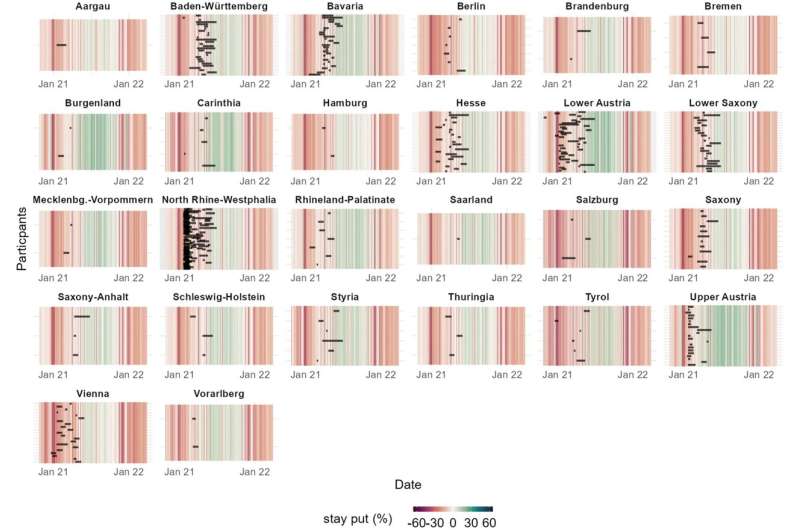During COVID-19-related lockdowns, face-to-face communication was of much greater importance for mental health than digital communication alternatives. This is according to a study conducted by the Karl Landsteiner University of Health Sciences in Krems,
Among the digital alternatives, in turn, text communication (mail, SMS, WhatsApp) surprisingly had stronger positive effects on mental well-being than the popular video conferencing. The results of the study were recently published in Scientific Reports.
During the COVID-related lockdowns, appeals were made worldwide to maintain social contacts—while keeping a physical distance (social distancing). Many individuals, companies, and organizations such as schools heeded these appeals and dramatically increased their use of digital communications. However, the extent to which these alternatives can replace face-to-face communication when it comes to psychological well-being has remained unclear. Now, the study from KL Krems has published interesting data to clarify this question.
Recipe for mental health
“The results of our comprehensive study are unequivocal,” explains Dr. Willinger, a researcher in the Division of Psychological Methodology at KL Krems. “Face-to-face interpersonal contact was highly beneficial to mental well-being during the lockdown.”
In fact, the results show that mental health was significantly influenced by the extent of face-to-face communication in presence. This influence was so strong that the importance of this communication type could even be demonstrated for individual days with above-average personal contact.
Says Dr. Willinger, “The study participants simply fared better psychologically on those days when they had more face-to-face conversations.”
Data collection during the pandemic provided ongoing information on contactactivities and mental well-being for over 400 individuals from several countries. In addition, the extent and nature of other activities (e.g., sports) as well as gender, age, nationality, or relationship status were collected. In this way, nearly 10,000 data sets were collected, which were then analyzed using complex statistical evaluations.
The study found personal face-to-face contacts to be clearly the most important factor in mental well-being. Even physical activities or time spent outdoors could not match their importance. Additionally with digital text communication or video chats, these positive effects on mental health were significantly less pronounced than with face-to-face communication.
‘Write again…’
However, the research team experienced another surprise as it compared the importance of the different digital communication channels.
Intuitively, they had assumed that video conferences enriched with facial expressions, gestures and eye contact were “better for the mood” than typing on keyboards to send text messages. But it turned out to be just the opposite. Dr. Willinger says, “Using a special statistical model, we were able to show that mails, SMS or WhatsApp were better for the mental well-being of the study participants than video chats and conferences.”
In fact, this unexpected result fits in with brand-new comparable studies and individual case reports. For example, experts are currently discussing so-called “zoom fatigue”, i.e. exhaustion caused by video conferencing. Possible causes are suspected to be tension about one’s own appearance during the transmission, unusually long eye contacts, oversized facial images thanks to large monitors, camera positions that create an intimidating viewing angle from above, or cognitive problems caused by technical delays in sound-image synchrony.
For the team, the question at the end of the current study is whether future advanced Internet technologies will manage to implement digital communication in such a way that they can replace the now confirmed positive effects of personal communication in presence. Because, according to their study, until now, face-to-face interaction still supports mental well-being the most.
More information:
S. Stieger et al, Face-to-face more important than digital communication for mental health during the pandemic, Scientific Reports (2023). DOI: 10.1038/s41598-023-34957-4
Provided by
Karl Landsteiner University of Health Sciences
Citation:
Video calls are less beneficial for mental health than mail, SMS and other modes of communication, finds study (2023, July 13)
retrieved 13 July 2023
from https://medicalxpress.com/news/2023-07-video-beneficial-mental-health-mail.html
This document is subject to copyright. Apart from any fair dealing for the purpose of private study or research, no
part may be reproduced without the written permission. The content is provided for information purposes only.


